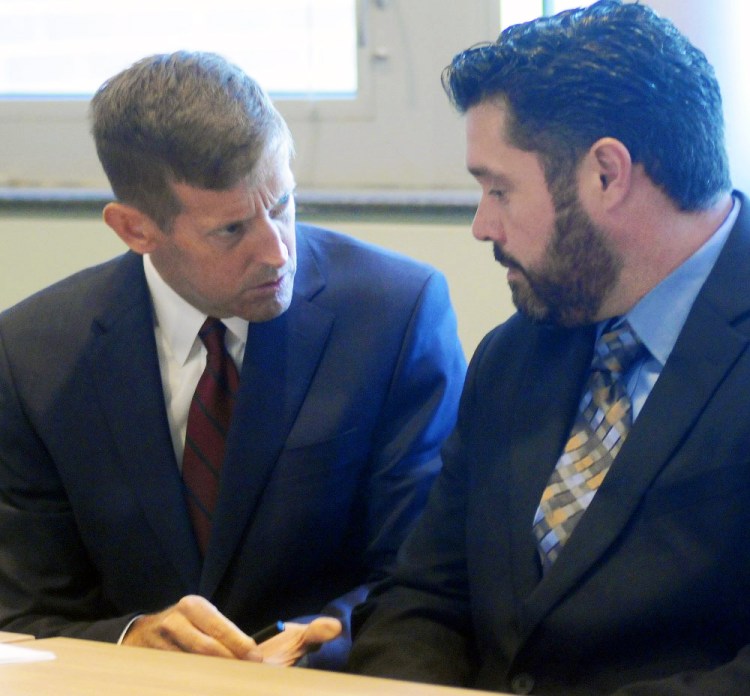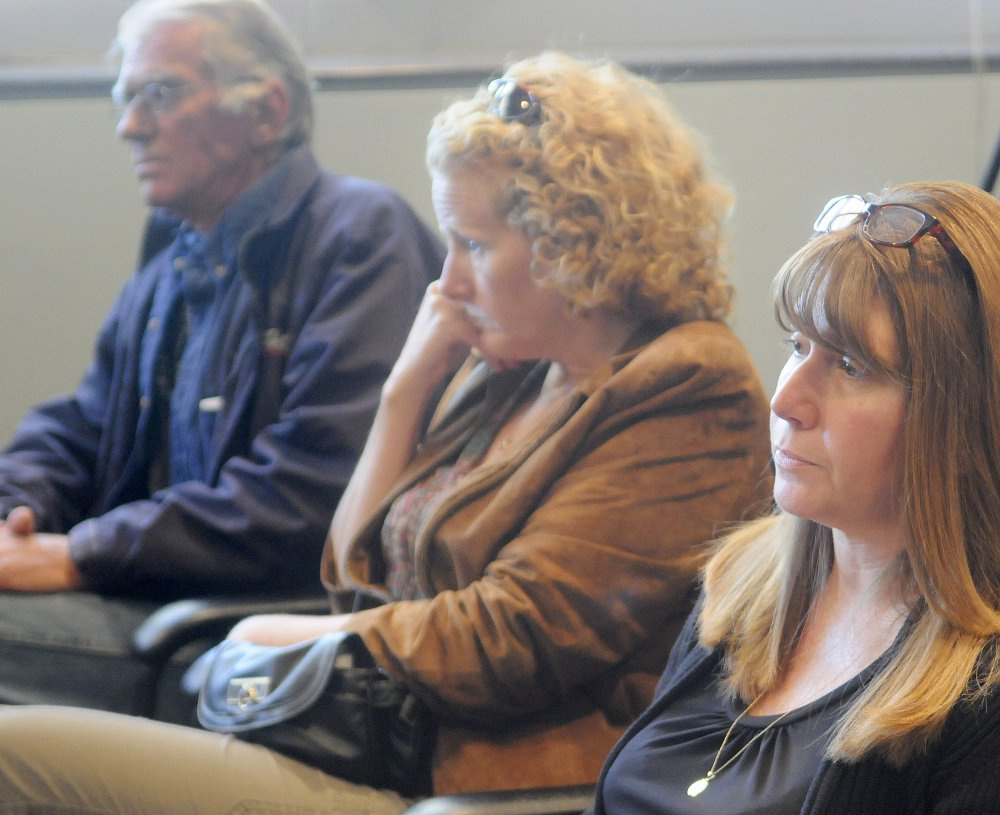AUGUSTA — A state motor vehicles examiner has denied a request for license reinstatement by a former Skowhegan man convicted in a drunken driving crash in 1996 that killed three people and severely injured two others.
Bryan Carrier, 39, of Fairfield, had sought to get his right to drive back after it was suspended for life when he was sentenced in 1997. A provision of Maine law allows someone whose license is revoked permanently to appeal for reinstatement 10 years after his final day in prison.
During a hearing Sept. 26, friends and family members of Arlyce Jewell, 42; her 10-year-old son, Alex; and Elbert Knowles, 15, who all died in the crash, appealed to hearings examiner Benjamin Tucker to keep Carrier off the road as the sentencing judge had directed — for life.
Tucker, calling the crash “criminal homicide,” agreed in a written decision, noting that Carrier had not made any “meaningful attempt to console or apologize directly for (the) immense pain and grief” until the September reinstatement hearing.
Tucker also writes in his decision dated Oct. 13 that Facebook messages by Carrier in 2015 “indicate a level of callousness about their impact on family members.”
Tracey Rotondi, of Athens, daughter of Arlyce and older sister of Alex Jewell, introduced Carrier’s Facebook messages during the Sept. 26 hearings at the Bureau of Motor Vehicles in Augusta. Rotondi told the hearing officer that Carrier’s use of profanity responding to comments critical of his request to get his license back were offensive to her and her family.
“You know what that makes me and others feel when we read that’s how you talk about what you did?” she said during the hearing. “It’s hurtful, and I’d like you to look at me in the eye and say you’re sorry, because you never have, and I think I deserve that from you.”
On Tuesday, Rotondi, who at 42 is the same age her mother was when she was killed, said she was relieved that this round of hearings was finally over. She has said that repeated bids by Carrier to get his license reinstated brought back all the memories of the night of that fiery crash.
“I am so relieved and very thankful for the decision that was made by the hearing examiner,” said Rotondi, the Somerset County treasurer. “I feel if Mr. Carrier is truly sorry and cares, he will take responsibility for his actions and live with the consequences of the judge’s decision — lifetime suspension of license — and stop putting us all through this, especially after seeing how much hurt and pain he causes all of us during this process.”
She said despite the pain that the hearings cause, she will be there “every time, making sure the judge’s decision is upheld.”
Carrier declined comment when contacted Tuesday. His lawyer, Walter McKee, of Augusta, said Tuesday that his client “is obviously disappointed.”
“He showed that he was no public safety risk and that he needs a license,” McKee said. “We certainly respect the opinion of the families of the victims, but at the end of the day, by all standards Bryan should have been allowed to have his license back. We will take a long hard look at the decision and decide whether to appeal in the next week.”
Carrier’s prior petitions for license reinstatement, in 2009 and 2011, also were denied.
Carrier, who was 19 years old at the time of the accident, drove a pickup truck at high speed through a stop sign on East Ridge Road in Skowhegan and slammed into a van that was heading east on U.S. Route 2. He pleaded guilty in 1997 in Somerset County Superior Court to three counts of manslaughter and three counts of aggravated operating under the influence. Carrier’s blood-alcohol level after the crash was 0.11, over the legal limit of 0.08.
He was sentenced to 10 years in prison with all but two years suspended, six years of probation and 2,000 hours of community service on the manslaughter conviction. On the OUI charge, Carrier was sentenced to two years in prison to run at the same time as the manslaughter sentence and ordered to pay $6,000 in fines.
In addition, his driver’s license was suspended for life. He was released March 30, 1999, from the Charleston Correctional Facility.
Leading up to the September hearing, McKee had said there is a provision under state law that allows a person whose license is revoked permanently to petition the state to get his or her license back 10 years after the date the person is no longer incarcerated.
McKee said the request to the secretary of state’s office for license reinstatement included a provision that Carrier’s car or truck be equipped with a restrictive ignition interlock device, which would prevent the vehicle from starting if alcohol is detected by the device after the driver breathes into the machine. He said safety would not be a problem if Carrier’s license were reinstated.
“He wants to be able to be a meaningful participant in society,” McKee said in the days before the hearing. “He lives in the Fairfield area, where there’s no public transportation and no way for him to go to kids’ events, to go to the grocery store, to be a dad to his daughters that requires, to a certain degree, a license.”
In his decision to deny Carrier’s license reinstatement, Tucker, the hearings officer, noted that Carrier “made a sincere apology” for his actions in 1996 during the September hearing.
“I am truly sorry for what I’ve done,” Carrier said at the hearing, adding that he cannot take away the pain the families continue to feel. “I hope that someday you can forgive me.”
Carrier, who still works for the family business, Carrier Chipping, said he is not the same person he was 20 years ago. He said he is married with two children and relies on his mother to take him places and often rides a bicycle to work. He said he has undergone counseling.
Tucker said he considered testimony given by members of Carrier’s family about his dedication to family, including a second daughter born since Carrier’s previous requests for reinstatement; his hard work for the family business; the effect of witnessing his own father die in a horrific work accident; his remorse for the deaths and injuries he caused in 1996; and his willingness to accept any restriction on his driver’s license.
But Tucker said he would deny Carrier’s bid to drive again and that Carrier would have to continue to rely on family members to get to work and run errands.
“Based on Bryan Carrier’s and his family’s testimony, I find that Bryan Carrier has a need for his driver’s license for work and family,” Tucker writes in his decision. “There is no question that he has difficulty meeting his family and work obligations — but he is able to meet them with the support of family. I also find there is no evidence that he would pose a safety risk on public roads.”
Tucker goes on to say that aside from a Facebook message to Nicole Johnson, who was injured badly in the crash, Carrier has not attempted to contact other friends and family members of the people who died in the crash. He said he found testimony of victims and victims’ relatives opposing Carrier’s reinstatement to be compelling.
He notes that Royce Jewell, husband and father of the crash victims, said it has been “torture” revisiting reinstatement hearings.
In his final decision, Tucker said statements in testimony from friends and family members of the crash victims “outweigh Mr. Carrier’s need and desire to drive on Maine’s roads.”
Carrier and his attorney can appeal Tucker’s this decision to the Superior Court within 30 days.
Doug Harlow — 612-2367
Twitter:@Doug_Harlow
Send questions/comments to the editors.






Comments are no longer available on this story